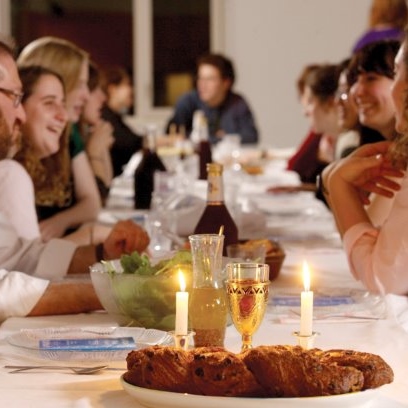
SA

Shabbos Project puts youth centre stage
SIMON SHEER
Giving students the space come up with their own ideas, the thinking goes, will produce a fresh perspective and original, creative ideas. The result? Pop-up shuls, customised fridge magnets, and Shabbos-themed board games (over 35s may be surprised to hear that, along with pot plants and ceramics, board games are hip again) plus a whole lot more.
The students’ initiatives include programmes aimed at enriching participants’ Shabbos meals at home with their families, as well as a number of communal gatherings.
Some events exists in the space between private and community events. For example, Leora Kuper and her fellow students living in Oaklands, Johannesburg, are planning a Shabbos block party. By closing off a street and installing dinner tables, and even a bar service, the event makes it easy for people who don’t normally observe Shabbos to have a halachically sound Shabbos party. It’s also a great chance for neighbourhood families to come together.
Moving to the north of the city, Georgia Luntz says that a number of pre-Shabbos activities are being planned at Sandton Shul, such as havdalah candle making. They’re even planning a “Jewber” transport service to commute to different shuls in the area.
On Shabbos day, Luntz and Shabbos Project teammates envision a “walk and talk”, providing material to discuss while on your Shabbos stroll, producing a shiur on the go. But it’s not all serious, board games and table tennis are also very much on the agenda.
Tali Sacks, Dinah Hurwitz, and Tali Pantanowitz have a plan to bring the young people of Illovo together for a party. After Friday night dinner with their respective families, it’s time to gather at the Illovo Chabad for the de rigueur board games, but with a twist: life-sized board games and human foosball. Purists can rest assured that regular board games will also be available.
The next day will proceed in high style, featuring a seudah shlishit (third) meal at the shul grounds, which will be transformed into a Bedouin-themed shuk for the afternoon.
Kayla Diamond, of King David Linksfield, and Saul Joseph, of Yeshiva College, have a plan to make a special Shabbos lunch available to everyone. They’ve devised a giant lunch for the Sydenham community. The meal will be priced so that it is affordable, but residents are also encouraged to donate food and decor towards the lunch. Following the event, any remaining supplies will be donated to charity.
Many of the students emphasised that the Shabbos Project is an opportunity to bring the different congregations of a neighbourhood together. Devorah Hodes and Rebecca Breger want to unify Savoy and Waverley, aiming to attract congregants from Waverley Shul, Ohr Sameach Savoy, and Savoy Chabad. Their plan includes a seudah shlishit picnic at the Weinberg Family Park in Savoy. It promises to be a party: not just festive food and drink, a giant sing-along is planned, complete with special-edition songbooks.
Gathering the young congregants of the various Glenhazel shuls in a single location sounds like a logistical headache, but Kerryn Sher, Michaella Wald, Ariella Lurie, Ben Marks, Dovi Levitt, Gidon Fox, Anna Goldstein, Aviel Abrams, and Jacob Sacks have a simple, inspired solution: a pop-up shul, where neighbourhood teens can gather to sing and chill out after attending their regular shuls with their families.
In Cape Town, student organisers are no less focused on learning and fun. For example, Ben Zieff and his fellow Herzlia students are designing interactive games for primary school students at the various Herzlia campuses. The games offer students a fun way to deepen their understanding of the Shabbos experience, and are also good conversation-starters for the family Shabbos table.
Chief Rabbi Dr Warren Goldstein said that the South African community could take pride in the students’ energy and initiative.
“It’s really encouraging to see the next generation of leaders emerging with so many fresh and creative ideas. This is very much in line with the spirit of the Shabbat Project, which is essentially a grassroots social movement. Its success depends on volunteers coming forward to take ownership of the initiative, and make it come alive, and it’s a great source of pride to see our student leaders jump into action like this.”




